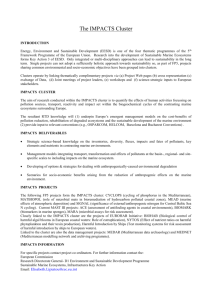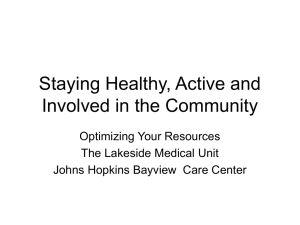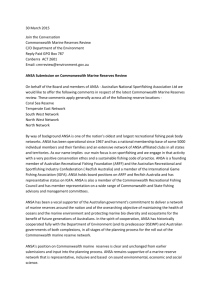American Sportfishing Association B.A.S.S LLC Center for Coastal
advertisement
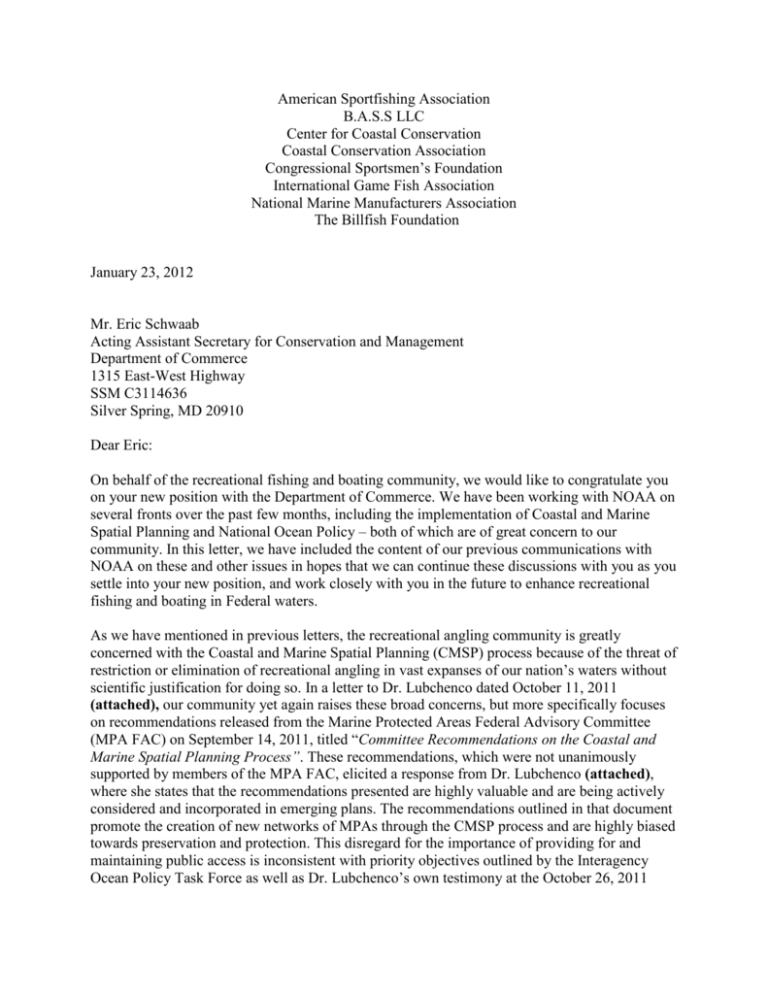
American Sportfishing Association B.A.S.S LLC Center for Coastal Conservation Coastal Conservation Association Congressional Sportsmen’s Foundation International Game Fish Association National Marine Manufacturers Association The Billfish Foundation January 23, 2012 Mr. Eric Schwaab Acting Assistant Secretary for Conservation and Management Department of Commerce 1315 East-West Highway SSM C3114636 Silver Spring, MD 20910 Dear Eric: On behalf of the recreational fishing and boating community, we would like to congratulate you on your new position with the Department of Commerce. We have been working with NOAA on several fronts over the past few months, including the implementation of Coastal and Marine Spatial Planning and National Ocean Policy – both of which are of great concern to our community. In this letter, we have included the content of our previous communications with NOAA on these and other issues in hopes that we can continue these discussions with you as you settle into your new position, and work closely with you in the future to enhance recreational fishing and boating in Federal waters. As we have mentioned in previous letters, the recreational angling community is greatly concerned with the Coastal and Marine Spatial Planning (CMSP) process because of the threat of restriction or elimination of recreational angling in vast expanses of our nation’s waters without scientific justification for doing so. In a letter to Dr. Lubchenco dated October 11, 2011 (attached), our community yet again raises these broad concerns, but more specifically focuses on recommendations released from the Marine Protected Areas Federal Advisory Committee (MPA FAC) on September 14, 2011, titled “Committee Recommendations on the Coastal and Marine Spatial Planning Process”. These recommendations, which were not unanimously supported by members of the MPA FAC, elicited a response from Dr. Lubchenco (attached), where she states that the recommendations presented are highly valuable and are being actively considered and incorporated in emerging plans. The recommendations outlined in that document promote the creation of new networks of MPAs through the CMSP process and are highly biased towards preservation and protection. This disregard for the importance of providing for and maintaining public access is inconsistent with priority objectives outlined by the Interagency Ocean Policy Task Force as well as Dr. Lubchenco’s own testimony at the October 26, 2011 Congressional oversight hearing by the House Committee on Natural Resources on the National Ocean Policy. Disappointingly, we have yet to receive a response to our inquiry from Dr. Lubchenco. Our community is closely reviewing the National Ocean Policy Draft Implementation Plan to determine to what extent these and other recommendations of the MPA FAC have been incorporated and how closely it follows Executive Order 12962 as amended by Executive Order 13574, which mandates Federal agencies, in cooperation with the States, to improve the quantity, function, sustainable productivity, and distribution of U.S. aquatic resources for increased recreational fishing opportunities where practical and permissible by law by “ensuring that recreational fishing shall be managed as a sustainable activity in national wildlife refuges, national parks, national monuments, national marine sanctuaries, marine protected areas, or any other relevant conservation or management areas or activities under any Federal authority, consistent with applicable law.” In addition to the recommendations released on September 14, 2011, the MPA FAC released three documents in December of 2011, titled:“Committee Recommendations for Integrated Management Using a Cultural Landscape Approach in the National System;” “Committee Recommendations on Marine Protect Areas and Healthy Coastal Communities,” and “Committee Recommendations on Managing Marine Resources Across the Land/Sea Interface.” While we have not formally commented on these recommendations, we would like you to be aware of several concerns we have in regard to their substance, including internal inconsistencies, and the process associated with their creation. Specifically, the recommendations on the Cultural Landscape Approach appear to give consideration to some of our concerns regarding the National Ocean Policy and CMSP. Several aspects that recreational fishermen have been voicing concerns for have been incorporated, including the segregation of the term fishers into commercial and recreational fishermen, a general focus on incorporating human uses, including recreational fishing, in CMSP, and a focus on the incorporation of sound science into the development of a National System of Marine Protected Areas. While we have some criticisms of this document -- including the interchangeable use of the terms conservation and preservation and the failure to prioritize recreational angling as an ocean use -- we feel some of our concerns have been addressed. We also found the recommendations on Healthy Coastal Communities to be an improvement in approach, although they failed to separate recreational and commercial fishermen in this document. Related, it is concerning that these changes were applied inconsistently throughout the three recommendations. As we mentioned previously, recreational and commercial fisherman are treated as separate user groups in one set of recommendations while the other simultaneously released whitepaper continues to treat them as one entity. It is helpful for advisory bodies to be consistent in their recommendations as well as their language used. In addition to our concerns over the inconsistencies and content of these three recommendations released in December 2011, we also are concerned more specifically about the process associated with the release of these recommendations. While we understand the want of the MPA FAC to Page | 2 remain involved and active in current policy issues by releasing recommendations, it is important to consider not only the quantity but the quality of work that can be produced by one group in a short period of time. As we mentioned earlier, these three sets of recommendations were released simultaneously. According to the MPA Center website, the only full meeting of the FAC during the time that these recommendations would have been drafted and reviewed was one three-day meeting of the full FAC in New Orleans, where all three of these documents were voted on by the FAC members who were able to attend. According to the MPA Center website, there are no conference calls on record or any evidence of further discussion on these documents by the full FAC. One meeting to both discuss and vote on three documents by the full FAC that can have a direct impact on economic, social, and cultural values is unacceptable. Our community is very concerned about this rushed and, therefore, potentially non-inclusive process, and has released comments expressing such concerns through the MPA Center External Review Process (attached). As NOAA proceeds with the implementation of the National Ocean Policy and CMSP, we hope you will take our concerns into consideration. Once again, we congratulate you on your new position and look forward to working with you in the future to conserve our aquatic resources and promote recreational fishing in Federal waters. Sincerely, Mike Nussman, President and CEO American Sportfishing Association Ellen Peel, President The Billfish Foundation Noreen Clough, Conservation Director B.A.S.S LLC Jeff Crane, President Congressional Sportsmen’s Foundation Jeff Angers, President Center for Coastal Conservation Rob Kramer, President International Game Fish Association Pat Murray, President Coastal Conservation Association Thom Dammrich, President National Marine Manufacturers Association Page | 3
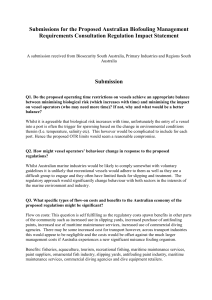
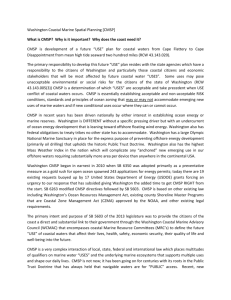

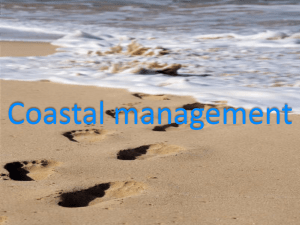
![[Share-My-Toys Membership] Marketing Plan](http://s2.studylib.net/store/data/005475303_1-5c5fcecf250fc9c92c1a18cc8f242409-300x300.png)

